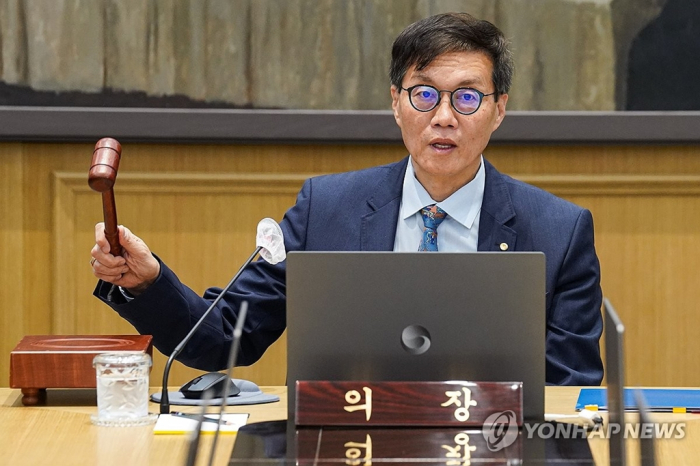Central bank
BOK chief says inflation may ease more slowly than expected
Most BOK policymakers say the central bank may need to raise the policy interest rate in the next three months
By Oct 19, 2023 (Gmt+09:00)
2
Min read
Most Read
LG Chem to sell water filter business to Glenwood PE for $692 million


Kyobo Life poised to buy Japan’s SBI Group-owned savings bank


KT&G eyes overseas M&A after rejecting activist fund's offer


StockX in merger talks with Naver’s online reseller Kream


Mirae Asset to be named Korea Post’s core real estate fund operator



South Korea’s central bank chief on Thursday said inflationary pressure in Asia’s fourth-largest economy may ease more slowly than earlier expectations amid growing uncertainties over the war between Israel and Hamas, leaving the door open to raising its policy interest rate.
Bank of Korea Governor Rhee Chang-yong made the remarks after the monetary authority kept the base interest rate at 3.50% in a unanimous decision for a sixth straight meeting as widely predicted.
“Due to the effects of higher global oil prices and foreign exchange rates, and the Israel-Hamas conflict, it is judged that consumer price inflation for this and next year is more likely to be above the August forecasts,” Rhee told reporters after the interest rate decision. The central bank predicted inflation for 2023 and 2024 at 3.5% and 2.4%, respectively, in August.
“It is forecast that the pace of inflation slowdown will moderate more than previously expected.”
After the comments, government bond yields rose across the board. The highly liquid three-year bond yield advanced 3.9 basis points (bps) to 4.070%, while the five-year debt yield gained 6.3 bps to 4.214% in the domestic bond market, according to the Korea Financial Investment Association. The 10-year note yield grew 7.5 bps to 4.362%.
The yields have been supported by expectations that the US Federal Reserve may take a higher-for-longer approach to interest rates. The predictions boosted concerns over capital outflows from South Korea, given the US policy interest rate in a target range between 5.25-5.50%, the highest in 22 years.
UNCERTAIN IF INFLATION FALLS TO 2% TARGET IN DECEMBER 2024
Rhee said it is uncertain whether or not inflation will fall to the central bank’s long-term target of 2% by the end of December 2024.
“We had expected inflation to head to that level, but the pace could be slower than our forecasts in August,” he said.
Consumer prices rose 3.7% last month from a year earlier, their fastest pace since April, government data showed earlier. Oil prices continued to climb amid the deadly military conflict between Israel and Hamas, ramping up inflationary pressure in South Korea.
The country’s monetary policymakers said the BOK may need to raise the policy interest rate in the next three months to tame inflation, Rhee said.
“Five out of six Monetary Policy Board members, excluding me, said we need to leave the door open for an additional policy interest rate hike,” he said.
“Inflationary pressure increased and it may take more time to head to the (inflation) target, so they said we may have to tighten more than expected in August.”
(Updated with government bond yields)
Write to Jin-gyu Kang at josep@hankyung.com
Jongwoo Cheon edited this article.
More to Read
-
 EconomyKorea expects inflation to ease from Oct after 5-month high
EconomyKorea expects inflation to ease from Oct after 5-month highOct 05, 2023 (Gmt+09:00)
2 Min read -
 MarketsKorea markets melt as Fed officials foresee longer-than-expected high rates
MarketsKorea markets melt as Fed officials foresee longer-than-expected high ratesOct 04, 2023 (Gmt+09:00)
5 Min read -
 Central bankBOK chief’s top mission: Soft landing for household debt
Central bankBOK chief’s top mission: Soft landing for household debtAug 24, 2023 (Gmt+09:00)
2 Min read
Comment 0
LOG IN


